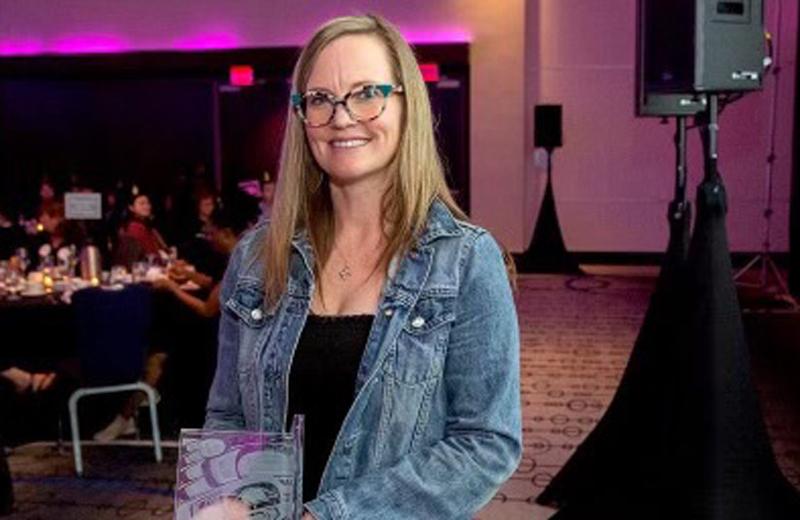Earlier this year Reanne Sanford, Regional Nursing Lead for Harm Reduction, was one of two nurses recognized provincially by the BC Nurses Union with an Excellence in Leadership and Advocacy Award.
The purpose of the award is to honour a member who has “made a difference to the health and well-being of their community and their profession through leadership, activism, or social justice efforts.” Reanne was nominated by fellow Northern Health staff member and nursing colleague, Lindsay Willoner, and was humbled by the gesture. Making it even more special, the award came in her 20th year of being a nurse.
“It was quite an honour to be nominated and recognized regionally by my fellow colleague,” shared Reanne when asked what it meant to her. “I was extremely humbled and shocked that I was selected and received the award, at a provincial level, in front of 500 people. It’s nice to see some attention and media dedicated to harm reduction and overdose prevention work.”
We sat down with Reanne to learn more about her award-winning advocacy work and the path that has led her to harm reduction.
Compassionate care
Having spent much of her career working in community health and public health nursing, she was exposed to harm reduction supports and services, and describes these as “compassionate care.”
“In public health nursing, part of our role was to hand out harm reduction supplies. There was a part-time street nurse role in Quesnel, and I worked alongside and learned a lot from her,” says Reanne.
In fact, she was hired for that very same street nurse role in 2012 and provided harm reduction services like outreach services, advocating for clients accessing health care, and prescribing naloxone to clients at risk for overdose. Quesnel was one of the first communities to have naloxone, the medication used to treat opioid overdoses, in Northern BC.
In 2016, Reanne became a regional nursing lead focused on harm reduction and sexual health. At the time, this role was new, but only two weeks after starting in the position, the Province of British Columbia declared the toxic drug crisis to be a public health emergency. Understandably, since then, the work has evolved and the positions have been adjusted to provide more dedicated workforce. She now focuses only on harm reduction; there are now two harm reduction nursing positions, as well as two harm reduction coordinators (non-nursing positions) who make up the team supporting a Northern response to the crisis.
Harm reduction in action
In her role, Reanne spends much of her time building policies and practices to support harm reduction work on the front lines of Northern Health. She developed the Northern Health clinical practice standards for overdose prevention services, drug checking, and naloxone, and has travelled around the region training others on how to administer it. What began as three sites for take-home naloxone has grown to over 200 sites region-wide.
She is involved in the work of providing access to overdose prevention services where people who use drugs can be safer and use in the presence of someone trained to respond.
“The people I represent and advocate on behalf of are not always supported by other community members. There is a burden of stigma, and we are trying to shift the narrative and develop understanding about substance use and the people who use substances,” says Reanne.
In January 2023, in a move to “fight against the toxic drug crisis,” BC decriminalized the possession of certain illegal drugs for personal use, and Reanne has been supporting staff capacity and education for how to keep both staff and people who use drugs safe in this transition. Developing key messages and helping the public to better understand these types of initiatives is central to the work she does.
Celebrating success among the challenges
The work of harm reduction is not without its challenges.
“I did a lot of personal unlearning – you do a lot of unlearning in this field, and you must be mindful of your own biases and beliefs to be effective,” says Reanne. “Working directly with people who use substances has been one of the highlights of my career, they have taught me so much and I continue to learn every day from them.”
“This is the type of work that never leaves your desk, while it moves forward it moves at a snail’s pace.” She reflects that it’s also “hard to celebrate success, when there is so much grief and loss within our communities.”
Northern Health celebrates the passion and commitment for harm reduction that Reanne and her colleagues display and offers congratulations on her very well-deserved award!














Comments